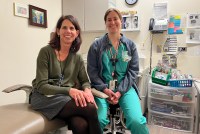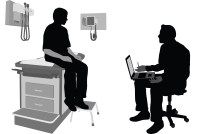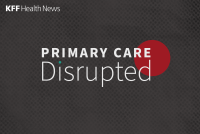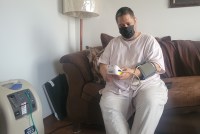Latest KFF Health News Stories
Doctors Take On Dental Duties to Reach Low-Income and Uninsured Patients
More doctors are integrating oral health care into their practices, filling a need in America’s dental deserts.
Médicos de atención primaria asumen tareas de dentista para ayudar a pacientes vulnerables
En Denver, la inestabilidad de la vivienda, las barreras del idioma, la falta de transporte y el “costo astronómico” de la odontología sin seguro hacen que la atención dental sea inaccesible para muchos nuevos inmigrantes.
Ten Doctors on FDA Panel Reviewing Abbott Heart Device Had Financial Ties With Company
Most of the doctors the FDA tapped to advise it on an Abbott medical device had financial ties to the company. The FDA didn’t disclose the payments.
Cada vez mueren más menores por sobredosis. ¿Podrían los pediatras ayudar más?
La Academia Americana de Pediatría recomienda ofrecer buprenorfina a los adolescentes adictos a los opiáceos. Sin embargo, según los resultados de una encuesta, solo el 6% de los pediatras informa haberlo hecho alguna vez.
More Kids Are Dying of Drug Overdoses. Could Pediatricians Do More to Help?
The surge in overdose deaths among teens is opening a new path to treatment: pediatricians. A doctor in Massachusetts shows how it works with a 17-year-old patient.
More Patients Are Losing Their Doctors — And Trust in the Primary Care System
A shortage of primary care providers is driving more people to seek routine care in emergency settings. In Rhode Island, safety-net clinics are under pressure as clinicians retire or burn out, and patients say it’s harder to find care as they lose connections to familiar doctors.
Hospitals Cash In on a Private Equity-Backed Trend: Concierge Physician Care
Hospitals are increasingly stretching a velvet rope, offering “concierge service” to an affluent clientele. Critics say the practice exacerbates primary care shortages.
How Primary Care Is Being Disrupted: A Video Primer
Under pressure from increased demand, consolidation, and changing patient expectations, the model of care no longer means visiting the same doctor for decades.
Overdosing on Chemo: A Common Gene Test Could Save Hundreds of Lives Each Year
The FDA and some oncologists have resisted efforts to require a quick, cheap gene test that could prevent thousands of deaths from a bad reaction to a common cancer drug.
Needle Pain Is a Big Problem for Kids. One California Doctor Has a Plan.
The pain and trauma from repeated needle sticks leads some kids to hold on to needle phobia into adulthood. Research shows the biggest source of pain for children in the health care system is needles. But one doctor thinks he has a solution and is putting it into practice at two children’s hospitals in Northern California.
Covid and Medicare Payments Spark Remote Patient Monitoring Boom
Demand for help monitoring patients’ vital signs remotely has taken off since a Medicare change in 2019. Dozens of companies now push the service to help overburdened primary care doctors — and as a revenue stream. But some policy experts say its growth has outpaced oversight and evidence of effectiveness.
California Pushes to Expand the Universe of Abortion Care Providers
A new California law allows trained physician assistants, also called physician associates, to perform first-trimester abortions without the presence of a supervising doctor. The legislation is part of a broader effort by the state to expand access to abortion care, especially in rural areas. Some doctor groups are wary.
Is the Nation’s Primary Care Shortage as Bad as Federal Data Suggest?
Federal policymakers have been trying for a long time to lure more primary care providers to understaffed areas. The Biden administration boosted funding in 2022 to address shortages and Sen. Bernie Sanders (I-Vt.) pushed sweeping primary care legislation in 2023. But when KFF Health News set out last year to map where the primary care workforce shortages really are — and where […]
¿Dónde están los proveedores de atención primaria del país? La respuesta no es fácil
Expertos en el tema sienten una frustración persistente: es difícil saber si alguna política está funcionando porque los datos que recopila el gobierno federal sobre las áreas de escasez de atención primaria no han sido fidedignos durante mucho tiempo.
Where Are the Nation’s Primary Care Providers? It’s Not an Easy Answer
Politicians keep talking about fixing primary care shortages. But flawed national data leaves big holes in how to evaluate which policies are effective.
Covid sigue matando gente. Esto recomiendan los médicos para protegerse
Las pandemias no se definen por el tiempo ni por la gravedad, sino por grandes cantidades de infecciones en curso en todo el mundo. Las emergencias son agudas y se declaran para desencadenar una respuesta urgente.
‘Emergency’ or Not, Covid Is Still Killing People. Here’s What Doctors Advise to Stay Safe.
Thousands of people are still dying of covid, but government has mostly handed over responsibility to the people to weather the seasonal surges with their own strategies.
America’s Health System Isn’t Ready for the Surge of Seniors With Disabilities
More than a third of older adults have a disability. Many find it difficult to get the medical care they need. New federal regulations would address that problem.
The AMA Wants a Medicare Cut Reversed – And Lawmakers To Stay Out of Care
Congress is back this week and feverishly working on a bipartisan agreement to fund the government for the rest of the 2024 fiscal year. Ahead of a potential vote, I spoke with Jesse Ehrenfeld, the president of the American Medical Association, the nation’s largest lobby group for doctors, about his organization’s priorities in Washington. Some […]
Rising Malpractice Premiums Price Small Clinics Out of Gender-Affirming Care for Minors
Even in states where laws protect minors’ access to gender-affirming care, malpractice insurance premiums are keeping small and independent clinics from treating patients.





















